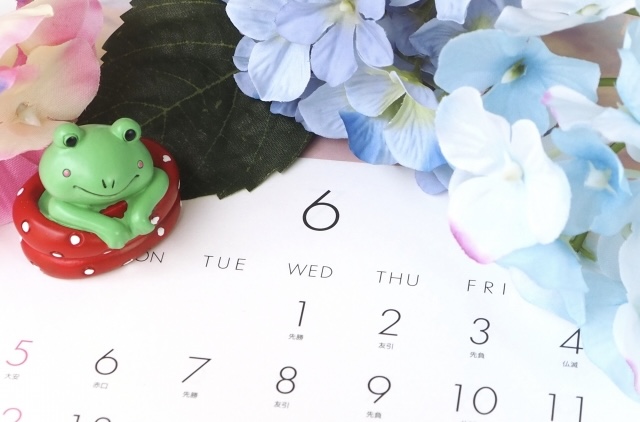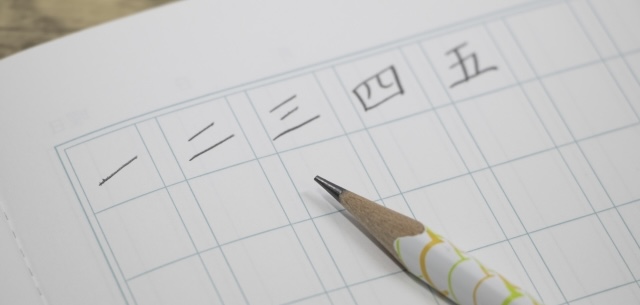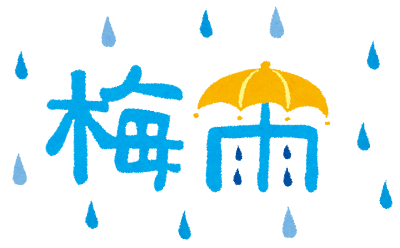The English translation is below
『梅雨』と同じ漢字で書いてありますが、読み方はそれぞれ
「つゆいり」と「ばいうぜんせん」です
こういうのがきっと、学習者さんを悩ませているのでしょうね
これは漢字の「音読み」と「訓読み」の違いなんですけど
そんなのは気にしなくていいです
ザックリ説明すると、中国から入ってきた発音をもとにするものが
「音読み」で、もともと日本にあった言葉に漢字をあてた読み方が
「訓読み」というわけです
私たち日本人も学校で習ったんだとは思いますが
「送り仮名があるからたぶん訓読みだよね」
「熟語だから音読みっぽいよね」くらいの認識です

同じ漢字で読み方が違うと言えば「数詞」なんかもそうですね
匹、本、杯、羽。。。
梅雨だけに、蛙(かえる)が一匹(いっぴき)二匹(にひき)
三匹(さんびき)。。。
傘が一本(いっぽん)二本(にほん)三本(さんぼん)。。。
梅酒が一杯(いっぱい)二杯(にはい)三杯(さんばい)。。。
お、でも法則があるっぽい!と思って喜んだら
ホトトギスが一羽(いちわ)二羽(にわ)三羽(さんば)。。。
見事に期待は打ち砕かれます
雨宿りをする人が、一人(ひとり)二人(ふたり)三人(さんにん)
…ってなんなの?!

あと数字自体の読み方も、後ろの数詞によって変わったりします
特に4、7、9の数字は
四個(よんこ)七枚(ななまい)九階(きゅうかい)
だったりするのに時間の読み方になると
四時(よじ)七時(しちじ)九時(くじ)。。。
でもこういうのに対して文句言ってる日本人って聞いたことないんですよ
疑問に思う前に聞き慣れすぎて、馴染んじゃったんだと思います
テレビをつければアナウンサーが
『こんばんは 7時(しちじ)のニュースです』
『9時(くじ)になりました ニュースをお伝えします』
と言ってるのを毎日毎日聞いてましたから
(ななじ)や(きゅうじ)なんて違和感しかないです
よく考えたらおかしいのに、ソックスのことを「靴下」
なんて普通に言いますからね。何度も流れるから
いつの間にか覚えてしまったCMのキャッチフレーズもあるし…

だから語学の勉強って、自然に覚えられるように積極的に
リスニングを取り入れた方がいいと思うんですよ!
私自身も、スペイン語を勉強するのに毎日ポットキャストを
聞いています!おかげで自然な言い回しなどが身についてきてる
んじゃないかな?
ポットキャストは何かしながら聞けるのがいいところだと思いますね
私は、洗面所にBluetoothスピーカーを置いてスマホとつなぎ
スキンケアやメイクをしながら聞いています♪
もちろん通勤時もイヤホンで!無料でこんなにネイティブから
学べるなんてありがたいことですね
皆さんはなにか日本語のポットキャストを聞いていますか?
ただ、オススメを聞かれても私は分からないんでね…
日本語ネイティブは日本語学習のポットキャスト聞かないですから。。。
同じ日本語学習者さんたちのほうが、皆さんのレベルに合った
ポットキャストを紹介してくれるんじゃないかな?と思います
The words “tsuyu-iri” (the start of the rainy season) and “baiu-zensen” (the seasonal rain front) are written with the same kanji — 梅雨 — but they’re read differently.
This kind of thing probably confuses a lot of Japanese learners!
The reason is that Japanese has two main ways of reading kanji: on-yomi and kun-yomi.
But don’t worry — you don’t need to memorize all the rules.
To put it simply, on-yomi readings come from the original Chinese pronunciation,
while kun-yomi readings are native Japanese words that were later written using kanji.
So “baiu” is the on-yomi reading, and “tsuyu” is the kun-yomi one.
I’m sure we Japanese learned all this back in school,
but honestly, most of us only have a rough sense of it.
Something like, “It has okurigana, so it’s probably a kun-yomi,”
or “It’s a compound word, so it’s likely an on-yomi.”
That’s about as far as our “expertise” goes!
Speaking of kanji that are read differently depending on the situation, “counters” are another good example — like 匹 (hiki), 本 (hon), 杯 (hai), or 羽 (wa).
And since it’s the rainy season, let’s count some frogs! 🐸
One ippiki, two nihiki, three sanbiki…
Umbrellas go ippon, nihon, sanbon…
Plum wine goes ippai, nihai, sanbai…
“Oh! There must be a pattern!” you think—
until you meet the cuckoo: ichiwa, niwa, sanba… 💥
And just when you thought you had it all figured out,
you find people go hitori, futari, sannin…
Seriously, what’s going on?!
Even the numbers themselves change their reading depending on what follows.
Four apples? yonko. Seven sheets? nanamai. Nine floors? kyūkai.
But when it comes to telling time, it suddenly becomes yoji, shichiji, kuji!
And yet, you never hear Japanese people complaining about it.
I guess we’ve just heard it so many times that it stopped feeling strange.
Turn on the TV and you’ll hear newscasters saying,
“Good evening. This is the seven o’clock news.”
or “It’s nine o’clock. Here are today’s headlines.”
Every single day!
Say nanaji or kyūji instead, and it just sounds… wrong.
Come to think of it, we say kutsushita (“shoe under”) for socks,
and we’ve memorized tons of commercial jingles
just by hearing them over and over again.
That’s how language seeps into us—quietly but completely.
That’s why I really think listening practice is key when learning a language—
it helps you absorb things naturally!
I myself listen to Spanish podcasts every single day,
and I feel like I’ve started picking up more natural expressions that way.
What I love about podcasts is that you can listen while doing other things.
I keep a Bluetooth speaker in my bathroom,
so I can connect it to my phone and listen while doing my skincare or makeup.
Of course, I also listen on my commute!
It’s amazing that we can learn directly from native speakers for free these days.
Do you listen to any Japanese podcasts?
Honestly, I can’t really recommend any…
Native speakers don’t usually listen to Japanese podcasts, after all! 😅
But I bet fellow Japanese learners could give you better recommendations—
something that perfectly matches your level and interests.


